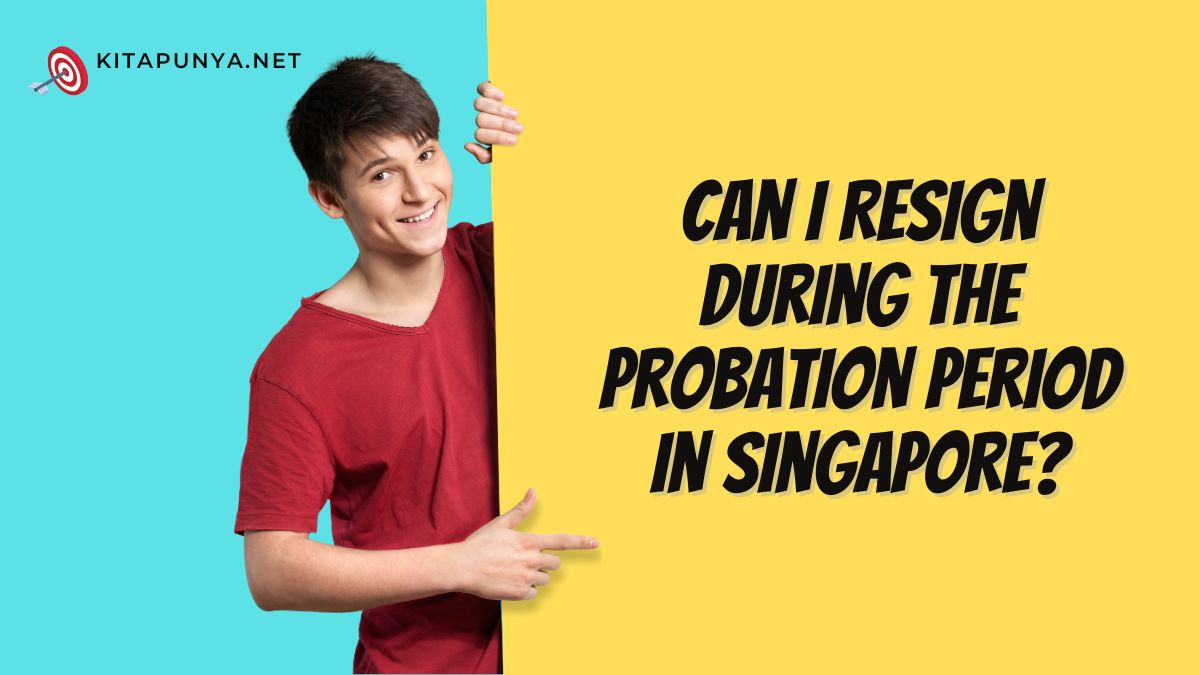Can I Resign During the Probation Period in Singapore? – If you are thinking of resigning during your probation period, you might have some questions and concerns. How will it affect your future employment prospects? What are the legal implications? How should you handle the situation professionally and gracefully?
In this blog post, we will try to answer some of these questions and provide some tips on how to resign during your probation period without burning any bridges or damaging your reputation.
What is a Probation Period?
A probation period is a trial period of employment that usually lasts between three and six months, depending on the company and the role. During this time, both the employer and the employee can assess each other’s suitability and performance, and decide whether to continue or terminate the employment relationship.
A probation period is not a binding contract, and either party can end it at any time, with or without notice. However, there may be some terms and conditions in your employment contract that you need to be aware of, such as:
- The length of the probation period and whether it can be extended or shortened
- The notice period required to resign or terminate the employment during the probation period
- The entitlements and benefits that apply during the probation period, such as sick leave, annual leave, bonuses, etc.
- The performance expectations and evaluation criteria that you need to meet during the probation period
- The consequences of failing to meet the performance expectations or violating the company policies during the probation period
Before you decide to resign during your probation period, make sure you read and understand your employment contract carefully, and consult a legal professional if you have any doubts or questions.
Can I Resign During Probation Period?
If you are unhappy with your current job and want to quit, you might be wondering if you can resign during your probation period. The probation period is a trial period for both the employer and the employee to assess the suitability of the job and the work environment. It usually lasts for three to six months, depending on the contract and the company policy.
The good news is that yes, you can resign during your probation period. You are not obligated to stay in a job that does not meet your expectations or does not make you happy.
However, there are some things you should consider before handing in your resignation letter.
First, you should check your employment contract and see what it says about the notice period during the probation period. Some contracts may require you to give a shorter notice than the standard one, such as one week or one month. Others may not specify any notice period at all, which means you can leave immediately. However, it is always advisable to give some notice, even if it is not required, to maintain a good relationship with your employer and avoid burning bridges.
Second, you should be prepared to explain your reasons for leaving and be honest and respectful. You can say that the job was not a good fit for you, or that you found a better opportunity elsewhere. You should avoid criticizing the company, the management, or the colleagues, as this will only create a negative impression and damage your reputation. You should also thank your employer for the opportunity and express your gratitude for their support.
Third, you should try to complete any pending tasks and hand over your responsibilities to someone else. You should also return any company property, such as keys, badges, or equipment. You should leave on good terms and offer to help with the transition if needed.
Resigning during your probation period is not a bad thing, as long as you do it professionally and courteously. It is better to leave a job that does not suit you than to stay and be unhappy or unproductive. However, you should also be careful not to make a habit of quitting jobs during probation periods, as this may raise red flags for future employers and affect your employability.
Why do people resign during their probation period?
There are many reasons why people may choose to resign during their probation period. Some of the common ones are:
- They find a better job opportunity elsewhere
- They realize that the job is not what they expected or wanted
- They are unhappy with the work environment, culture, or management style
- They face personal or family issues that prevent them from continuing the job
- They encounter health problems that affect their ability to work
Whatever your reason is, it is important to be honest and respectful when you communicate it to your employer. Do not lie or make up excuses that could damage your credibility or reputation. Also, do not badmouth your employer or colleagues, as this could harm your professional relationships and references.
10 Good Reasons to Resign During Probation Period
Probation period is a time when both the employer and the employee can evaluate each other and decide if they want to continue working together. It is usually a few months long and can be extended or shortened depending on the performance and the agreement of both parties.
However, sometimes you may realize that the job is not what you expected, or that you are not happy or satisfied with the work environment, the culture, the management, or the tasks. In that case, you may consider resigning during probation period, even if it means losing some benefits or facing some challenges.
Here are 10 good reasons to resign during probation period:
1. You have a better offer from another company
If you have received a more attractive offer from another employer, whether it is in terms of salary, benefits, career prospects, or work-life balance, you may want to take it and not waste your time and energy in a job that does not meet your expectations or goals.
2. You are not learning anything new or valuable
If you feel that the job is not challenging enough, or that you are not acquiring any new skills or knowledge that can help you grow professionally, you may want to look for other opportunities that can offer you more learning and development.
3. You are not compatible with the company culture
If you find that the company culture is not aligned with your values, beliefs, or personality, you may feel uncomfortable, frustrated, or unhappy at work. For example, if the company is too formal or rigid, and you prefer a more casual or flexible environment, or vice versa, you may not fit in well.
4. You are not getting along with your boss or colleagues
If you have a poor relationship with your boss or your co-workers, you may face conflicts, misunderstandings, or communication issues that can affect your performance and your morale. For example, if your boss is too micromanaging or demanding, or if your colleagues are too competitive or unfriendly, you may not enjoy working with them.
5. You are not passionate about the work
If you do not feel motivated or interested in the work that you do, you may lose your enthusiasm and your productivity. For example, if the work is too boring or repetitive, or if it does not match your skills or interests, you may not find any meaning or satisfaction in it.
6. You are not happy with the work conditions
If you are unhappy with the work conditions, such as the hours, the location, the facilities, the equipment, or the safety measures, you may feel stressed, tired, or unsafe at work. For example, if the work hours are too long or irregular, or if the location is too far or inconvenient, or if the facilities are too old or inadequate, you may not have a good work experience.
7. You are facing health issues
If you are facing health issues that affect your ability to work effectively and efficiently, you may want to resign and focus on your well-being. For example, if you have a chronic illness or injury that requires medical attention or rest, or if you have a mental health problem that causes anxiety or depression, you may not be able to perform well at work.
8. You are going through personal issues
If you are going through personal issues that affect your emotional stability and your availability for work, you may want to resign and sort out your situation. For example, if you have a family emergency or crisis that requires your attention or support, or if you have a personal problem that distracts you from your work responsibilities, you may not be able to balance your work and life.
9. You have ethical concerns about the company or the work
If you have ethical concerns about the company or the work that you do, such as illegal practices, unethical policies, corruption scandals, environmental damage, or social injustice, you may want to resign and distance yourself from them.
For example, if the company is involved in fraud or bribery, or if the work is harmful to people or animals, or if the company is violating human rights or labor laws, you may not want to be associated with them.
You have personal goals that are incompatible with the job. If you have personal goals that are incompatible with the job, such as pursuing further education, starting a business, traveling the world, or changing careers, you may want to resign and follow your dreams.
For example, if you want to go back to school or get a certification, or if you want to launch your own venture, or if you want to explore new places or cultures, or if you want to switch to a different field or industry, you may not be able to do so while working in your current job.
Resigning during probation period is not an easy decision, and it may have some drawbacks, such as losing your income, damaging your reputation, or burning bridges with your employer. However, if you have a good reason to do so, and if you are confident that it is the best option for you, you may want to go ahead and do it. Just make sure that you do it professionally and respectfully, by giving proper notice, completing your tasks, handing over your work, and thanking your employer for the opportunity.
How to resign during your probation period?
If you have decided to resign during your probation period, here are some steps that you should follow:
1. Write a formal resignation letter
A resignation letter is a document that informs your employer of your intention to leave the job. It should include:
- The date of the letter and the effective date of your resignation
- A brief explanation of why you are resigning
- A statement of gratitude for the opportunity and the experience
- A request for any final paperwork or formalities that need to be completed
- A signature and contact details
2. Give adequate notice
Depending on your employment contract, you may need to give a certain amount of notice before you leave the job.
This could range from a few days to a few weeks. If possible, try to give more notice than required, as this will show your professionalism and courtesy.
However, if you have a valid reason to leave immediately, such as a medical emergency or a personal crisis, you can explain it to your employer and ask for their understanding.
3. Prepare a handover report
A handover report is a document that summarizes the status of your projects, tasks, and responsibilities, and provides instructions and guidance for your successor or colleagues who will take over your work. It should include:
- A list of all the projects, tasks, and responsibilities that you were working on or assigned to
- The progress and completion status of each project, task, or responsibility
- The deadlines, priorities, and dependencies of each project, task, or responsibility
- The contact details of any clients, vendors, partners, or stakeholders involved in each project, task, or responsibility
- The location and access details of any files, documents, tools, or resources related to each project, task, or responsibility
- Any challenges, issues, risks, or recommendations related to each project, task, or responsibility
4. Have an exit interview
An exit interview is a meeting that usually takes place between you and your manager or HR representative before you leave the job. It is an opportunity for both parties to exchange feedback and insights on your performance, experience, and reasons for leaving. It is also a chance for you to clarify any outstanding issues or concerns that you may have.
During the exit interview, be honest but diplomatic in your responses. Avoid being negative or critical of your employer or colleagues. Instead, focus on the positive aspects of your job and what you learned from it. Thank them for their support and guidance during your probation period.
5. Maintain good relationships with your employer and colleagues
Even after you resign, you should try to maintain good relationships with your employer and colleagues. You never know when you might need their help, advice, or reference in the future. Therefore, it is advisable to:
- Keep in touch with them via email, phone, or social media
- Express your appreciation and gratitude for their cooperation and assistance
- Offer your help or advice if they need it
- Congratulate them on their achievements or milestones
- Wish them well on their endeavors or occasions
Resigning during your probation period can be a difficult and stressful decision, but it can also be a positive and beneficial one. By following these tips, you can ensure that you leave the job on good terms and with a good impression.
Read more:


